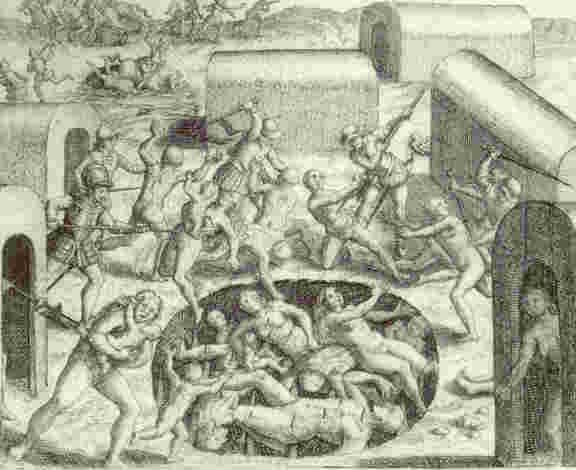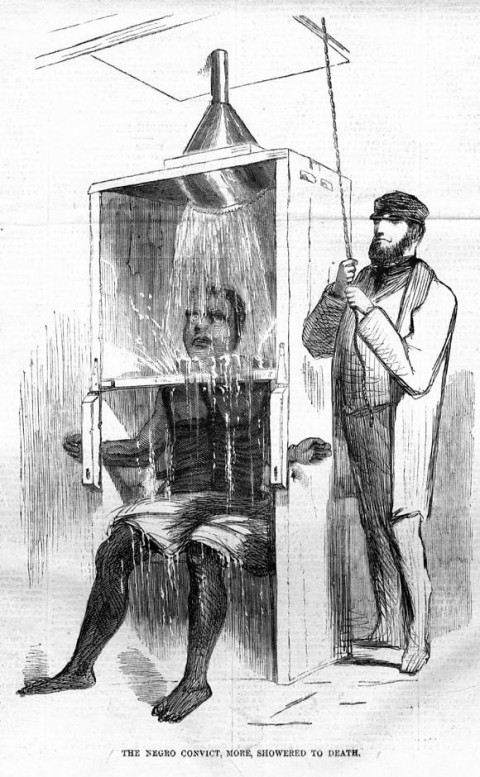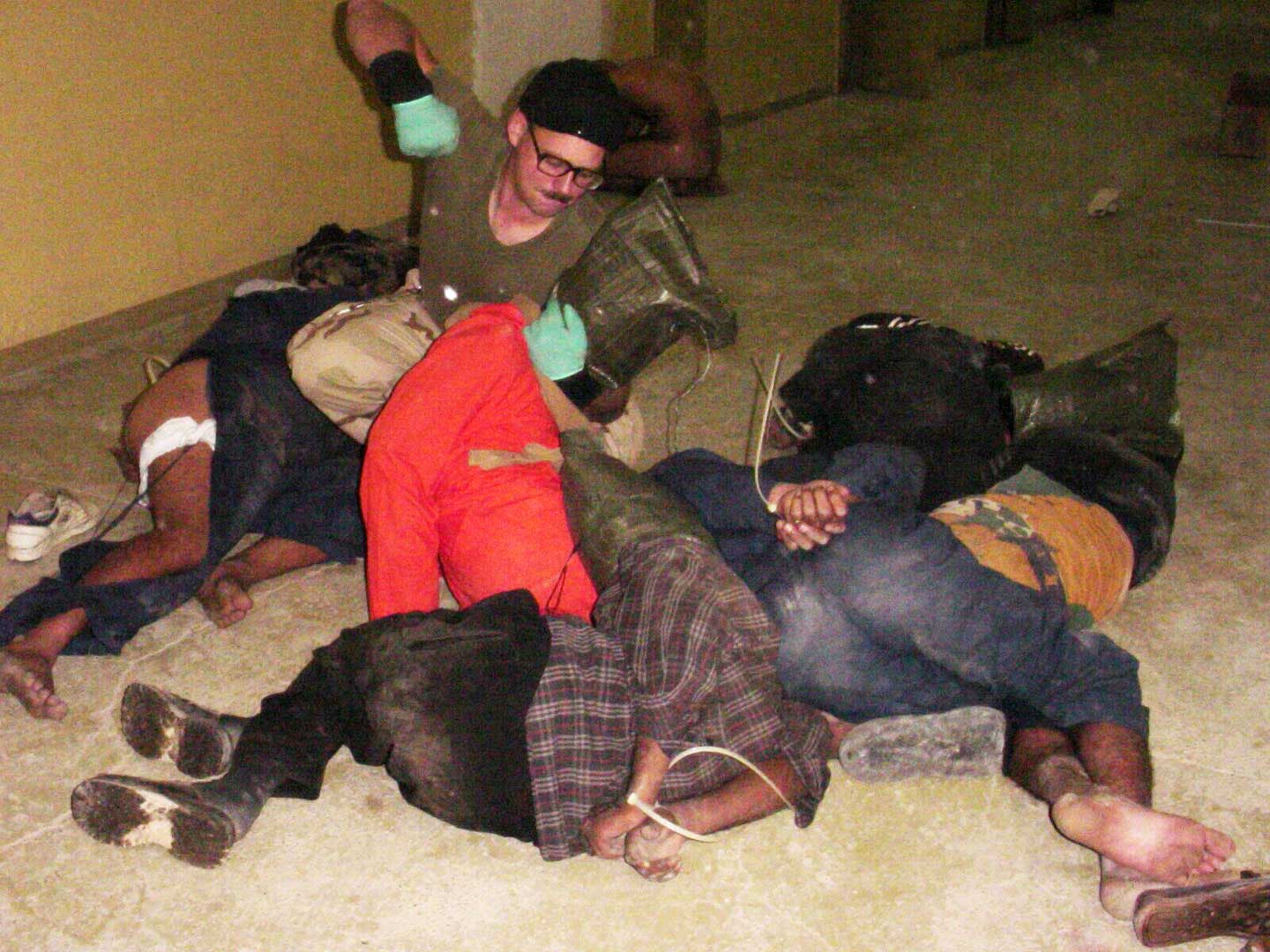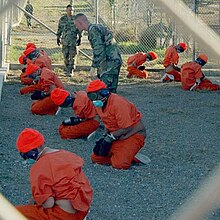
Savaged by dogs, Electrocuted With Cattle Prods, Burned By Toxic Chemicals, Does such barbaric abuse inside U.S. jails explain the horrors that were committed in Iraq?



They are just some of the victims of wholesale torture taking place inside the U.S. prison system that we uncovered during a four-month investigation for Channel 4 . It’s terrible to watch some of the videos and realise that you’re not only seeing torture in action but, in the most extreme cases, you are witnessing young men dying.
The prison guards stand over their captives with electric cattle prods, stun guns, and dogs. Many of the prisoners have been ordered to strip naked. The guards are yelling abuse at them, ordering them to lie on the ground and crawl. ‘Crawl, motherf*****s, crawl.’
If a prisoner doesn’t drop to the ground fast enough, a guard kicks him or stamps on his back. There’s a high-pitched scream from one man as a dog clamps its teeth onto his lower leg.
Another prisoner has a broken ankle. He can’t crawl fast enough so a guard jabs a stun gun onto his buttocks. The jolt of electricity zaps through his naked flesh and genitals. For hours afterwards his whole body shakes.
Lines of men are now slithering across the floor of the cellblock while the guards stand over them shouting, prodding and kicking.
Second by second, their humiliation is captured on a video camera by one of the guards.
The images of abuse and brutality he records are horrifyingly familiar. These were exactly the kind of pictures from inside Abu Ghraib prison in Baghdad that shocked the world this time last year.
And they are similar, too, to the images of brutality against Iraqi prisoners that this week led to the conviction of three British soldiers.
But there is a difference. These prisoners are not caught up in a war zone. They are Americans, and the video comes from inside a prison in Texas.
They are just some of the victims of wholesale torture taking place inside the U.S. prison system that we uncovered during a four-month investigation for Channel 4 that will be broadcast next week.
Our findings were not based on rumour or suspicion. They were based on solid evidence, chiefly videotapes that we collected from all over the U.S.
In many American states, prison regulations demand that any ‘use of force operation’, such as searching cells for drugs, must be filmed by a guard.
The theory is that the tapes will show proper procedure was followed and that no excessive force was used. In fact, many of them record the exact opposite.
Each tape provides a shocking insight into the reality of life inside the U.S. prison system – a reality that sits very uncomfortably with President Bush’s commitment to the battle for freedom and democracy against the forces of tyranny and oppression.
In fact, the Texas episode outlined above dates from 1996, when Bush was state Governor.
Frank Carlson was one of the lawyers who fought a compensation battle on behalf of the victims. I asked him about his reaction when the Abu Ghraib scandal broke last year and U.S. politicians rushed to express their astonishment and disgust that such abuses could happen at the hands of American guards.
‘I thought: “What hypocrisy,” Carlson told me. ‘Because they know we do it here every day.’
All the lawyers I spoke to during our investigations shared Carlson’s belief that Abu Ghraib, far from being the work of a few rogue individuals, was simply the export of the worst practices that take place in the domestic prison system all the time. They pointed to the mountain of files stacked on their desks, on the floor, in their office corridors – endless stories of appalling, sadistic treatment inside America’s own prisons.
Many of the tapes we’ve collected are several years old. That’s because they only surface when determined lawyers prise them out of reluctant state prison departments during protracted lawsuits.
But for every ‘historical’ tape we collected, we also found a more recent story. What you see on the tape is still happening daily.
It’s terrible to watch some of the videos and realise that you’re not only seeing torture in action but, in the most extreme cases, you are witnessing young men dying.
In one horrific scene, a naked man, passive and vacant, is seen being led out of his cell by prison guards. They strap him into a medieval-looking device called a ‘restraint chair’. His hands and feet are shackled, there’s a strap across his chest, his head lolls forward. He looks dead. He’s not. Not yet.
The chair is his punishment because guards saw him in his cell with a pillowcase on his head and he refused to take it off. The man has a long history of severe schizophrenia. Sixteen hours later, they release him from the chair. And two hours after that, he dies from a blood clot resulting from his barbaric treatment.
The tape comes from Utah – but there are others from Connecticut, Florida, Texas, Arizona and probably many more. We found more than 20 cases of prisoners who’ve died in the past few years after being held in a restraint chair.
Two of the deaths we investigated were in the same county jail in Phoenix, Arizona, which is run by a man who revels in the title of ‘America’s Toughest Sheriff.’
His name is Joe Arpaio. He positively welcomes TV crews and we were promised ‘unfettered access.’ It was a reassuring turn of phrase – you don’t want to be fettered in one of Sheriff Joe’s jails.
We uncovered two videotapes from surveillance cameras showing how his tough stance can end in tragedy.
The first tape, from 2001, shows a man named Charles Agster dragged in by police, handcuffed at the wrists and ankles. Agster is mentally disturbed and a drug user. He was arrested for causing a disturbance in a late-night grocery store. The police handed him over to the Sheriff’s deputies in the jail. Agster is a tiny man, weighing no more than nine stone, but he’s struggling.
The tape shows nine deputies manhandling him into the restraint chair. One of them kneels on Agster’s stomach, pushing his head forward on to his knees and pulling his arms back to strap his wrists into the chair.
Bending someone double for any length of time is dangerous – the manuals on the use of the ‘restraint chair’ warn of the dangers of ‘positional asphyxia.’
Fifteen minutes later, a nurse notices Agster is unconscious. The cameras show frantic efforts to resuscitate him, but he’s already brain dead. He died three days later in hospital. Agster’s family is currently suing Arizona County.
His mother, Carol, cried as she told me: ‘If that’s not torture, I don’t know what is.’ Charles’s father, Chuck, listened in silence as we filmed the interview, but every so often he padded out of the room to cry quietly in the kitchen.
The second tape, from five years earlier, shows Scott Norberg dying a similar death in the same jail. He was also a drug user arrested for causing a nuisance. Norberg was severely beaten by the guards, stunned up to 19 times with a Taser gun and forced into the chair where – like Charles Agster – he suffocated.
The county’s insurers paid Norberg’s family more than £4 millions in an out-of-court settlement, but the sheriff was furious with the deal. ‘My officers were clear,’ he said. ‘The insurance firm was afraid to go before a jury.’
Now he’s determined to fight the Agster case all the way through the courts. Yet tonight, in Sheriff Joe’s jail, there’ll probably be someone else strapped into the chair.
Not all the tapes we uncovered were filmed by the guards themselves. Linda Evans smuggled a video camera into a hospital to record her son, Brian. You can barely see his face through all the tubes and all you can hear is the rhythmic sucking of the ventilator.
He was another of Sheriff Joe’s inmates. After an argument with guards, he told a prison doctor they’d beaten him up. Six days later, he was found unconscious of the floor of his cell with a broken neck, broken toes and internal injuries. After a month in a coma, he died from septicaemia.
‘Mr Arpaio is responsible.’ Linda Evans told me, struggling to speak through her tears. ‘He seems to thrive on this cruelty and this mentality that these men are nothing.’
In some of the tapes it’s not just the images, it’s also the sounds that are so unbearable. There’s one tape from Florida which I’ve seen dozens of times but it still catches me in the stomach.
It’s an authorised ‘use of force operation’ – so a guard is videoing what happens. They’re going to Taser a prisoner for refusing orders.
The tape shows a prisoner lying on an examination table in the prison hospital. The guards are instructing him to climb down into a wheelchair. ‘I can’t, I can’t!’ he shouts with increasing desperation. ‘It hurts!’
One guard then jabs him on both hips with a Taser. The man jerks as the electricity hits him and shrieks, but still won’t get into the wheelchair.
The guards grab him and drop him into the chair. As they try to bend his legs up on to the footrest, he screams in pain. The man’s lawyer told me he has a very limited mental capacity. He says he has a back injury and can’t walk or bend his legs without intense pain.
The tape becomes even more harrowing. The guards try to make the prisoner stand up and hold a walking frame. He falls on the floor, crying in agony. They Taser him again. He runs out of the energy and breath to cry and just lies there moaning.
One of the most recent video tapes was filmed in January last year. A surveillance camera in a youth institution in California records an argument between staff members and two ‘wards’ – they’re not called prisoners.
One of the youths hits a staff member in the face. He knocks the ward to the floor then sits astride him punching him over and over again in the head.
Watching the tape you can almost feel each blow. The second youth is also punched and kicked in the head – even after he’s been handcuffed. Other staff just stand around and watch.
We also collected some truly horrific photographs.
A few years ago, in Florida, the new warden of the high security state prison ordered an end to the videoing of ‘use of force operations.’ So we have no tapes to show how prison guards use pepper spray to punish prisoners.
But we do have the lawsuit describing how men were doused in pepper spray and then left to cook in the burning fog of chemicals. Photographs taken by their lawyers show one man has a huge patch of raw skin over his hip. Another is covered in an angry rash across his neck, back and arms. A third has deep burns on his buttocks.
‘They usually use fire extinguishers size canisters of pepper spray,’ lawyer Christopher Jones explained. ‘We have had prisoners who have had second degree burns all over their bodies.
‘The tell-tale sign is they turn off the ventilation fans in the unit. Prisoners report that cardboard is shoved in the crack of the door to make sure it’s really air-tight.’
And why were they sprayed? According to the official prison reports, their infringements included banging on the cell door and refusing medication. From the same Florida prison we also have photographs of Frank Valdes – autopsy pictures. Realistically, he had little chance of ever getting out of prison alive. He was on Death Row for killing a prison officer. He had time to reconcile himself to the Electric Chair – he didn’t expect to be beaten to death.
Valdes started writing to local Florida newspapers to expose the corruption and brutality of prison officers. So a gang of guards stormed into his cell to shut him up. They broke almost every one of his ribs, punctured his lung, smashed his spleen and left him to die.
Several of the guards were later charged with murder, but the trial was held in their own small hometown where almost everyone works for, or has connection with, the five prisons which ring the town. The foreman of the jury was former prison officer. The guards were all acquitted.
Meanwhile, the warden who was in charge of the prison at the time of the killing – the same man who changed the policy on videoing – has been promoted. He’s now the man in charge of all the Florida prisons.
How could anyone excuse – still less condone – such behaviour? The few prison guards who would talk to us have a siege mentality. They see themselves outnumbered, surrounded by dangerous, violent criminals, so they back each other up, no matter what.
I asked one serving officer what happened if colleagues beat up an inmate. ‘We cover up. Because we’re the good guys.’
No one should doubt that the vast majority of U.S. prison officers are decent individuals doing their best in difficult circumstances. But when horrific abuse by the few goes unreported and uninvestigated, it solidifies into a general climate of acceptance among the many.
At the same time the overall hardening of attitudes in modern-day America has meant the notion of rehabilitation has been almost lost. The focus is entirely on punishment – even loss of liberty is not seen as punishment enough. Being on the restraint devices and the chemical sprays.
Since we finished filming for the programme in January, I’ve stayed in contact with various prisoners’ rights groups and the families of many of the victims. Every single day come more e-mails full of fresh horror stories. In the past weeks, two more prisoners have died, in Alabama and Ohio. One man was pepper sprayed, the other tasered.
Then, three weeks ago, reports emerged of 20 hours of video material from Guantanamo Bay showing prisoners being stripped, beaten and pepper sprayed. One of those affected is Omar Deghayes, one of the seven British residents still being held there.
His lawyer says Deghayes is now permanently blind in one eye. American military investigators have reviewed the tapes and apparently found ‘no evidence of systematic abuse.’
But then, as one of the prison reformers we met on our journey across the U.S. told me: ‘We’ve become immune to the abuse. The brutality has become customary.’
So far, the U.S. government is refusing to release these Guantanamo tapes. If they are ever made public – or leaked – I suspect the images will be very familiar.
Abu Ghraib, Guantanamo – or even Texas. The prisoners and all guards may vary, but the abuse is still too familiar. And much is it is taking place in America’s own backyard.

Deborah Davies is a reporter for Channel 4 Dispatches. Her investigation, Torture: America’s Brutal Prisons, was shown on Wednesday, March 2, at 11.05pm.
(In accordance with Title 17 U.S.C. Section 107, this material is distributed without profit to those who have expressed a prior interest in receiving the included information for research and educational purposes. Information Clearing House has no affiliation whatsoever with the originator of this article nor is Information Clearing House endorsed or sponsored by the originator.)




















